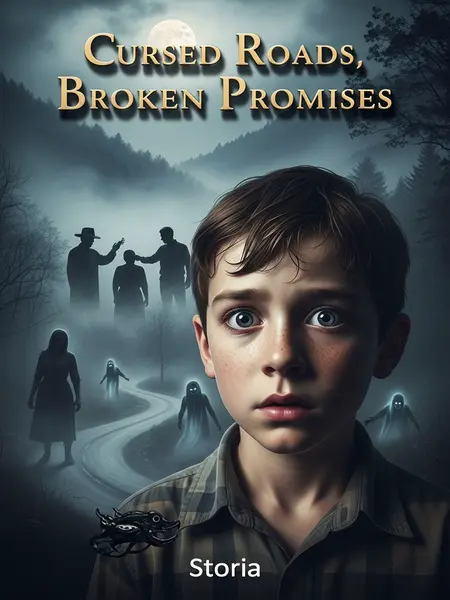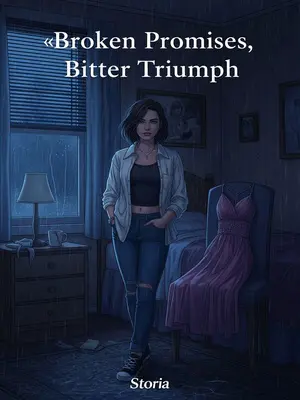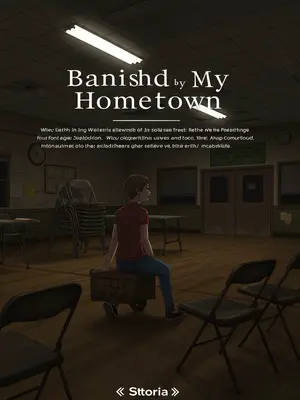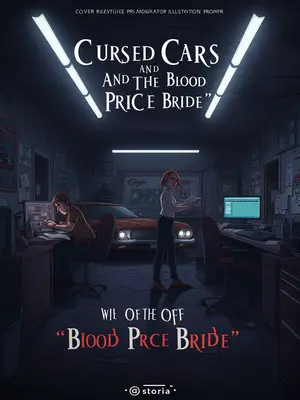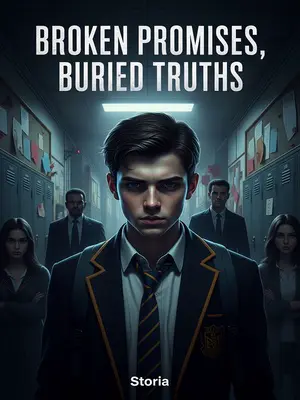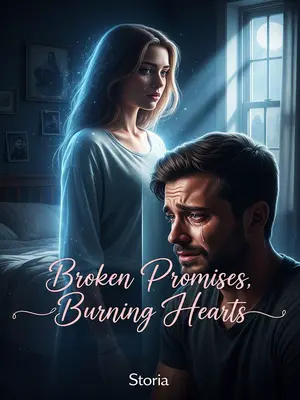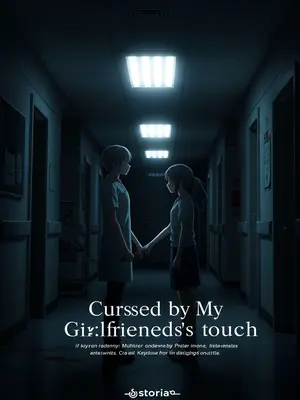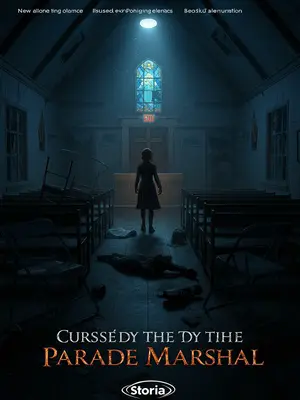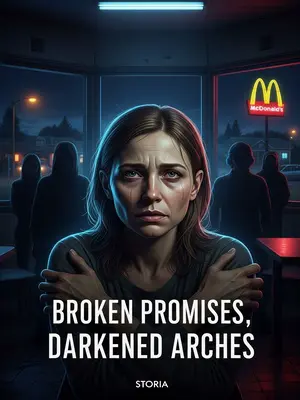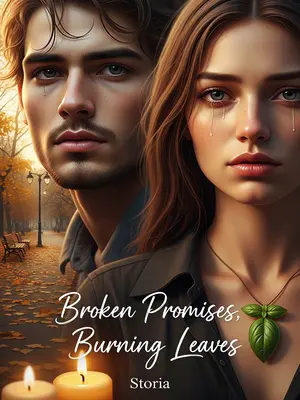Chapter 1: The Devil’s Backbone
When I was a kid, there was a winding mountain road behind our little town of Maple Heights. Plenty of folks had lost their lives on that stretch. My grandpa knew that road better than anyone, so people passing through would stop by and ask if he’d drive them.
I remember the way that road twisted through the hills—the cracked pavement nearly swallowed by wild grass, and the shadows of old maples arching overhead. The townsfolk called it Devil’s Backbone, and every kid in Maple Heights grew up hearing stories about cars vanishing in the fog or headlights tumbling down the ravine at night. Grandpa would always shake his head and say, with a pause for emphasis, “That road’s got a mean streak, Eli. You gotta know her moods.”
One afternoon, as dusk settled in and the sky turned orange behind the maple trees, a breeze rustled through the leaves and a man walked into our yard.
The air was thick with the smell of woodsmoke and the distant hum of cicadas. I was sitting on the porch steps, swinging my legs, when I spotted him trudging up the gravel drive, catching the last of the sunlight on his muddy boots.
He was caked in red clay, dirty all over. When he saw me, he managed a tired smile and asked, “Hey, kid, is your grandpa home? I need him to drive me over the mountain.”
His voice was hoarse, and he looked about ready to drop. The red clay caked on his jeans and jacket told me he’d probably come up from the old quarry road, not the main street like most people. I noticed his hands trembling as he wiped sweat from his brow, and his eyes kept darting over his shoulder, like he was trying to outrun something.
I answered, “He’s not here. My grandparents went up the ridge for firewood. They’ll be back soon. You can wait out here if you want.”
The man nodded. “Alright, then.”
I brought him a lawn chair. He sat down, rummaged through his jacket pockets, and muttered, “Cigarettes? Where’d my smokes go?” He patted himself down, coming up empty, then slumped back, shoulders sagging, like he’d already given up on the day.
I could hear the frustration in his muttering—the kind of tone grown-ups get when the world’s just a little too much. I felt awkward, not knowing what to say, so I just sat there, listening to the cicadas.
Just as he finished, I heard the crunch of boots and the low voices of my grandparents, and then my grandpa and grandma came back, each carrying bundles of branches.
Their boots crunched on the gravel. The sky was streaked with the last light, branches silhouetted against it. Grandpa’s face was flushed from the hike, and Grandma had her kerchief tied tight over her hair, cheeks rosy from the cold.
The man got up quickly, smiling. “Mr. Walker, you’re finally back. I was hoping you could help me drive.”
He almost tripped over the chair. His hands shook as he brushed off his jacket, nerves showing through. The way he said Grandpa’s name—like it was a lifeline—made me pay attention.
My grandpa froze when he saw the man, then paused, looking him up and down. He finally said, cold as January, “You’re not going to make it over that mountain tonight. Go home.”
His voice had a steel edge I’d never heard before. It made me sit up straight. Grandpa was usually the kind of man who’d offer a glass of sweet tea to anyone who showed up, but this time, he sounded like he was locking the door against a storm.
His tone was unusually cold, and I could feel something shift in the air. Grandpa never turned folks away, especially not truckers needing help. But tonight, he seemed different—almost scared.
The man blinked, surprised. After a moment, he stepped closer and tried again. “Mr. Walker, I know Dave Shull. He told me to come to you. If you help me get across, I’ll make it worth your while.”
He fished a crumpled slip of paper from his pocket, hands shaking, like proof of knowing Dave might change Grandpa’s mind. His voice cracked a little, desperate, and I could see the sweat beading on his forehead despite the cool air.
Grandpa narrowed his eyes. “Son, I’m not trying to scare you.” He paused, pipe in hand. “If you want to stay alive, turn back now.”
He headed inside with the firewood, not sparing the man another glance. I’d never seen him walk away from someone like that.
The man frowned deeply, staring after my grandpa, lost in thought. His shoulders slumped as he watched Grandpa disappear inside.
He slumped back down on the lawn chair, jaw clenched, his boots tapping a nervous rhythm on the porch boards. The silence between us grew heavy, broken only by the rustle of leaves overhead. I picked at a splinter on the step, not sure what to say.
Grandma walked over. “Young man, you should go home. There’s nothing worth more than your life, son.”
She spoke gently. But there was a firmness in her words I’d heard before—Grandma always believed in second chances, but when that worried crease showed up between her brows, you knew she meant business. She set her bundle of branches down and gave the man a long, searching look.
He looked like someone had punched him in the gut. “Ma’am, if I don’t deliver this load, my wife’s life is on the line. Please, help me convince him.”
His voice trembled, and I could see tears gathering in his eyes. He pulled out a battered wallet, showing a faded photo of a woman holding a baby. “She’s all I got. Please, ma’am.”
Just then, Grandpa came out of the mudroom. The man, seeing him, pleaded, “Mr. Walker, I know the mountain road’s dangerous. It’s a real gamble. If I’m unlucky, I could die in a wreck.” He paused, voice breaking. “But I’ve got no other option. My wife’s in the hospital, waiting on the money for her treatment. My son’s only seven months old, can’t even say ‘Dad’ yet. If my wife dies, my family’s done for. Please, help me.”
He choked up, voice breaking. The porch light flickered on above us, throwing long shadows across the yard. I could feel the weight of his words settle over all of us, heavy as the dusk. My hands tightened around my knees.
Grandpa sighed, pipe smoke curling from his lips. “Son, it’s not that I don’t want to help. But if Death’s coming for you, even if I get you through the worst stretch, you might not make it. Listen to me—go home.”
He looked older than I’d ever seen him, lines deepening around his eyes. He set his firewood down with a thump, pipe clenched between his teeth, and stared out toward the mountains like he could see something coming that none of us could.
As he finished, thunder rumbled across the clear sky. I jumped at the sound, heart thumping.
A low roll echoed through the hills, making the windows shiver. The air suddenly felt charged, the way it does before a Midwest summer storm.
Grandpa said, “Best to stay here tonight, head out in the morning.”
He gestured toward the porch, inviting the man to take shelter. I moved aside to make room, watching the man’s face go from desperate to lost.
The man’s eyes grew red. “Mr. Walker, Dave Shull said you’re the best. If I can’t deliver, I’ll owe the boss, and I just don’t have the money. Please, help me figure something out. I know it’s risky, but I’ve got to try. I can’t pay the damages.”
He gripped the porch railing so hard his knuckles turned white, voice quivering. The desperation in his eyes made me look away, ashamed I couldn’t do a thing.
Grandpa frowned, lit his pipe, and asked, pausing, “If I don’t help, what’ll you do?”
The pipe smoke curled around his head. He looked at the man with a mix of pity and sternness, like he did when he thought someone was about to make a bad mistake.
The man said, “I’ll drive the truck myself. If I die on that mountain, it’ll be an accident.” He hesitated, voice thick. “At least the insurance will pay out for my wife and son.”
He looked dead set, like he’d made up his mind. I believed him.
He squared his shoulders, jaw clenched, eyes hollow but determined. In that moment, I saw a man with nothing left to lose. It scared me.
Grandpa tapped his pipe against the doorframe a few times. “There’s one way, but you’ll have to face the Devil’s gate.”
He spoke the words quietly, almost like he was talking to himself. The mention of the Devil’s gate made the hair on my arms stand up. That was the spot on the mountain road where most of the accidents happened—a sharp turn with a drop-off so steep they said you could see straight into hell if you looked down at midnight.
The man’s eyes lit up. “If that’s what it takes, I’ll do anything.”
He leaned forward, hope flickering in his expression. I could see his chest rise and fall, breath coming fast.
Grandpa took a couple puffs from his pipe. “Martha, I need you to go wring a chicken and bring me half a bowl of blood.”
Grandma hesitated, pausing, glancing at Grandpa like she wanted to protest. But then she wrapped her shawl tighter and headed out into the dark. The old screen door creaked behind her.
Grandpa said, “Eli, go grab the red paper and marker from the den, would you?”
“Okay,” I replied, and ran to fetch them.
My hands shook a little as I rummaged through the cluttered desk drawer. I found the red construction paper leftover from last Christmas and a fat black marker, the smell of old ink mixing with the scent of pine from the woodpile.
Grandpa dipped the marker in the chicken blood and drew strange symbols on the red paper. He paused for a second, then asked, “What’s your name, son?”
I watched, wide-eyed, as the marker left dark, sticky lines across the paper. The smell was sharp and metallic, turning my stomach.
“My name’s Tom Harlan,” the man replied.
“Where’s home?”
“Silver Hollow.”
Grandpa frowned, shaking his head, lips pressed tight. “Silver Hollow’s too far. You won’t make it back in time.” Silver Hollow was at least two counties over—a long, winding drive through the hills.
“Then what should I do?”
Grandpa didn’t answer. He kept drawing on the red paper until it was filled with marks. Then he cut it into the shape of a shirt and draped it over the man’s shoulders.
The paper rustled as Grandpa settled it around Tom’s neck, the makeshift talisman looking kind of goofy on a grown man. But Tom stood there solemnly, like he’d just been handed a suit of armor.
